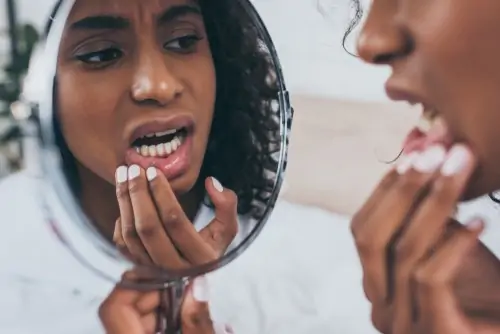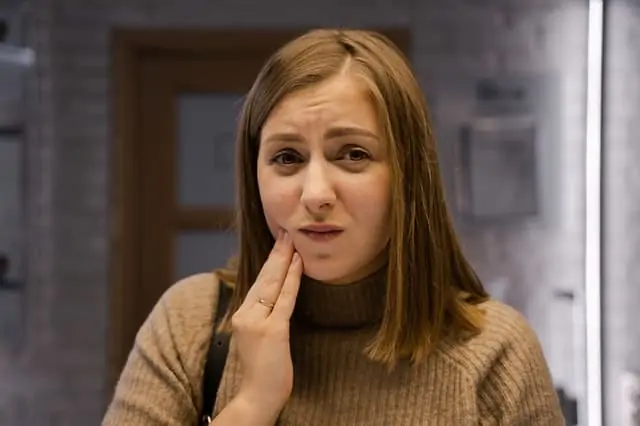Blog
19
Apr
4 Things You Can Do If You’re Feeling Self-Conscious About Your Smile

Whether you have an important event coming up or you’re just tired of seeing your tired smile every day on work video calls, there’s a cosmetic dentistry solution for you. Thanks to advancements in technology, cosmetic dentistry is more affordable than ever before and is no longer only for celebrities. In fact, these treatments are some of the most commonly completed by your dentist in Douglasville. Don’t wait to get the smile of your dreams, check out a few easy ways you can transform your smile.
What is Cosmetic Dentistry?
According to the American Academy of Cosmetic Dentistry, cosmetic dentistry is “dentistry aimed at creating a positive change to your teeth and your smile.” But that can mean different things to different people, which is why there are several different types of cosmetic dentistry solutions available in Douglasville depending on your specific needs and wants.
- Smile Whitening – The most common type of cosmetic dentistry completed by dentists (and even sometimes by patients at home) is smile whitening. This treatment can whiten the appearance of teeth and create a dazzling white smile. However, not all smile whitening is created equally. Professional, in-office smile whitening with your dentist in Douglasville can transform your smile’s color in just one visit, whereas other methods take several treatments. Either way, we always recommend talking with your dentist before starting any smile whitening treatment to make sure it’s the right solution for you and that your teeth are healthy enough. Sometimes tooth stains are too deep and won’t be fixed by smile whitening alone. So, before you spend money on over-the-counter strips, make sure your type of tooth discoloration can be improved with whitening.
- Veneers – If traditional smile whitening treatments aren’t for you, don’t fret, we have other options – one of which is dental veneers. These thin pieces of porcelain can whiten teeth, cover up chips or breaks, and fill in gaps. They’re custom-created to seamlessly flow with your teeth and can transform your smile.
- Bonding – Outside of discoloration, other cosmetic concerns may include chips, breaks, or gaps. When appropriate, dental bonding can be used to fix all of these ailments. Your dentist in Douglasville can complete a dental procedure quickly and easily and can give you a smile you’re confident about.
- Smile Makeovers – Sometimes your dentist will recommend a combination of cosmetic dentistry services (and often restorative dentistry treatments) to achieve the smile you’re looking for. This is known as a smile makeover and can be life-changing. Your dentist will carefully plan the stages of your transformation and make sure you’re involved every step of the way.
We don’t want anyone to feel self-conscious about their smile, and we’re always happy to help. If you’ve been hiding your smile, have an area that bothers you, or simply wish that something looked different, call to schedule a cosmetic dentistry consultation with us today!
How to Tell If You Have Gingivitis

Nearly 50% of Americans over the age of 30 have some form of gum disease, also known as periodontal disease. You may also hear your dentist in Douglasville refer to gum disease as gingivitis. So what’s the difference between gum disease and gingivitis, and how can you tell if you have one or the other?
A Glance at Gum Disease
Gum disease is an infection that affects the gums, but it can also travel throughout your bloodstream and cause health problems in other areas of the body. In fact, gum disease has been linked to an increased risk of heart disease and stroke. There are actually three stages of gum disease including:
- Gingivitis
- Periodontitis
- Advanced Periodontitis
Each stage of gum disease progresses in severity, and the longer gum disease goes undetected and untreated, the more likely it is to lead to other problems.
Early Diagnosis Is Key
When gum disease is caught in its earliest stage, your dentist in Douglasville will probably diagnose it as gingivitis. During this first stage, gingivitis can be treated and any damage that may have occurred can often be reversed. If gingivitis isn’t treated early, it can progress into periodontitis, lead to tooth loss, and create complications in both oral and overall health.
Warning Signs of Gingivitis
Everyone should visit their dentist in Douglasville at least twice a year for checkups and cleanings. These important dental visits can catch any problems, including gingivitis, early. But it’s also crucial to pay attention to any changes in your oral health in between these appointments. Some of the most common signs of gingivitis are:
- Bleeding gums (even when flossing!)
- Bad breath that doesn’t go away
- Swollen, puffy, painful gums
- Receding gums
- Dark red gums
If you notice any of the early warning signs of gingivitis, call to schedule an appointment with your dentist as soon as possible.
Who Can Get Gingivitis?
While anyone can get gingivitis, there are some things that can put someone at increased risk, such as:
- Tobacco use
- Crooked teeth that are difficult to clean
- Poor oral hygiene habits
- Chronic dry mouth
- Hormonal changes
- Age — older people are more likely to develop gum disease than younger people
Prevent Gingivitis, Protect Your Health
The best way to protect yourself from developing gingivitis in the first place is to take excellent care of your teeth. This means brushing your teeth twice a day and flossing once a day. You can also reduce your risk of gingivitis by adopting certain lifestyle habits such as drinking plenty of water, avoiding tobacco products, and eating a well-balanced diet that contains limited sugars.
Any form of gum disease can seem scary, but if you catch it early treatment can be very successful. So if it’s been longer than six months since your last dental appointment, call your dentist in Douglasville to schedule a checkup today.
Nutrition & Oral Health

Even though your dentist in Douglasville is all about keeping your mouth healthy, the truth is, proper nutrition and good oral health go hand-in-hand. This is why, during this National Nutrition Month, we want to do our part to raise awareness of the importance of eating right.
On A Nutrition Mission
When it comes to nutrition and eating healthy, it can seem simple from the surface — don’t eat too much sugar, eat your vegetables, limit fast foods. But when taking a deeper look into what the experts recommend, it can get pretty complicated. After all, even the United States Department of Agriculture (USDA) changed their recommendations twice since the Food Guide Pyramid was created in 1992. But healthcare professionals across the country, from dietitians to your dentist in Douglasville, are on a mission to make nutrition easier to understand.
The truth is, not all of us need the same things in the same quantities. Like many things, nutrition is individualized and is based on a number of factors such as age, gender, height, weight, activity level, and underlying health concerns. The best way to find out your nutritional needs is to go to MyPlate and customize the best mix of dietary recommendations for you.
Eat Well, Smile Happy
We all know that what we eat can affect our overall health and either increase or decrease our risk for certain diseases and health concerns. But your dentist in Douglasville wants you to know that what you eat also affects your oral health. In fact, many of the types of foods that can negatively affect our overall health can do the same for our teeth and include:
- Sugary Sweets
- Carbohydrates
- Fatty Foods
- Acidic Drinks
Foods or drinks that contain a lot of sugar, are high in carbs or fats, and foods and drinks that are acidic can damage tooth enamel and leave teeth exposed and at risk for decay.
The Hidden Sugar Effect
Many patients know that your dentist in Douglasville will caution people about the risks of sugary foods. However, a lot of us aren’t aware of why your dentist may also tell you to take it easy on the carbs. Even though high-carb foods don’t taste sweet, they have something called “the hidden sugar effect” which breaks carbs down into simple sugars and can affect your teeth in a similar way as sugar-packed sweets.
Foods For Teeth
When you’re planning your meals and snacks based on your MyPlate results, don’t forget to choose some foods that can help keep your teeth strong and decay-free. Some foods for teeth include:
- Dairy products such as cheese, milk, and yogurt
- Crunchy vegetables like carrots and celery
- Lean meats and fatty fish
- Water
During this National Nutrition Month, find your ideal balance of the major food groups and try to fit your individual recommendations in each and every day. Eating a well-balanced diet can go a long way in helping your body, and your mouth, stay healthy.
How Do I Know If Tooth Pain Is Serious?

Any type of ongoing tooth pain usually means something isn’t quite right. But does that mean every toothache requires a visit to your dentist in Douglasville? The short answer — probably. However, if your pain lasts for 2 or more days, isn’t reduced with painkillers, and is paired with swelling or a bad taste in your mouth, you need to get to a dentist.
Understanding Different Types of Tooth Pain
Different types of tooth pain could indicate different types of problems, and it’s important to know what various feelings could mean. Being able to explain your pain to your dentist in Douglasville can help find the underlying cause and get you treated and out of pain quickly. The following pain descriptors are to be used for informational purposes only and should not be used to diagnose any problem. Always see your dentist.
Dull, Chronic Ache
A constant, dull ache is the most common type of toothache and could be a sign of anything from a piece of food lodged in your gums or between your teeth to an abscess. This type of pain can also be a sign of tooth grinding. If not treated, grinding your teeth can lead to broken or chipped teeth and TMJ disorder. You may be able to get relief by gently flossing your teeth to remove a leftover food particle, but if that doesn’t work you should see your dentist for a more thorough evaluation.
Hot/Cold Sensitivity
A lot of people have sensitive teeth, and sometimes it’s managed well by using the right toothpaste and regular cleanings. But extreme sensitivity to hot or cold things may also be a sign of something more serious. Tooth sensitivity that doesn’t go away after about 30 seconds could indicate gum disease, tooth decay, worn enamel, or fractured teeth.
Thumping, Throbbing
Constant throbbing tooth pain can be a major distraction and keep you from doing other things such as working productively and sleeping. If it doesn’t go away it may be a sign of a cracked tooth, dying nerve, abscess or other infection, or an oral lesion. Call your dentist to find out and get relief.
Sharp Pain
A sharp, stabbing pain always requires a visit to your dentist and will most likely require some sort of restorative dentistry treatment. Sharp pain could mean you have a cavity, a cracked or broken tooth, or you have an old dental restoration such as a crown or filling that needs attention.
As we mentioned before, any type of tooth pain typically means something isn’t right and you should see your dentist in Douglasville for an exam, diagnosis, and treatment plan sooner rather than later.
Pandemic Stress & Oral Health Problems

As we head into the one-year mark of this pandemic, there are still several unknowns. But one thing has remained constant the whole time — stress levels are high, and rightfully so. Stress isn’t the best thing for health, especially at times like these. Prolonged periods of high stress can put us at increased risk for heart disease, actually make our immune systems less effective, and cause some unwanted gut problems. That’s not all. Dentists have also noticed an increase in oral health problems the past year, including this dentist featured in the New York Times. In today’s blog, your dentist in Douglasville explores some ways how stress can affect your oral health.
Chipped or Broken Teeth
You know how your body reacts kind of automatically when you’re stressed out? Maybe you start to sweat even though you’re not hot. Or perhaps your heart starts beating so fast it’s all you can hear. These and other subconscious reactions happen, and they’re not always so obvious. In fact, sometimes we don’t even notice that our body reacted at all. One great example of this is when we grind or clench our teeth. Many times we’re not even aware that we’re doing it, but it can certainly cause trouble. The constant pressure of teeth on teeth during clenching or grinding can cause tooth damage such as chips, cracks, or breaks and will require treatment from your dentist in Douglasville.
Jaw Pain
Unfortunately, the problems with clenching and grinding don’t end with damaged teeth. These repeated motions over and over again can start to cause jaw pain as the muscles in the jaw joint are overworked. If this happens over a long period of time, this can develop into TMJ disorder, and the pain can become severe and lead to other problems such as headaches, neck pain, and difficulty chewing.
Gum Disease
Now, besides the problems associated with clenching and grinding, there’s also the risk of gum disease. Gum disease is an infection in the gum tissue and is usually caused by poor dental hygiene or tobacco use. However, stress may also increase the risk of developing gum disease. Your dentist in Douglasville can treat gum disease if it’s caught early, but if the disease becomes more severe it also becomes irreversible. Untreated advanced gum disease can cause tooth loss and increase the risk of heart disease, kidney disease, and some cancers.
Canker Sores
It’s important to note that scientists have yet to determine one absolute cause of canker sores. But research conducted by the Academy of General Dentistry suggests a possible correlation between high levels of stress and the development of canker sores. Even though these painful bumps may be a little bit painful and a lot bit annoying, they’re not contagious or dangerous and should go away on their own.
Lower Your Stress, Lower Your Risk
We know it’s hard to lower your stress levels, especially nowadays, but we can’t stress enough just how important it is to try different ways to live as stress-free of a life as possible to lower your risk of health problems. Some ways to reduce stress include:
- Getting Enough Sleep. We need to sleep in order to recover and keep our bodies functioning properly. Aim for 8 hours a day and follow a regular routine of waking up at the same time every day.
- Exercising Every Day. Whatever your exercise of choice is, try to do it every day. Hop on a bike. Go for a walk. Do some high-intensity interval training. Just get sweating. Exercise has been proven to release endorphins which can decrease stress and keep us healthy.
- Breathing It Out. Meditation has been used for centuries as a stress-reduction tactic. Find a quiet space, focus on your breath, and clear your mind to lower heart rate, blood pressure, and help you relax.
Everyone is different, but try to find a stress-reduction technique that works for you and practice it every day. Your body, mind, and overall health will thank you for it.
Is My Mask Causing Bad Breath?

If wearing your mask has caused you to change the way you breathe, you’re not alone. Most of us are still getting used to wearing masks day after day, hour after hour, and many of us may have felt the need to adjust from breathing out of noses to breathing out of our mouths as a result. But can this change in breathing have oral health side effects? Your dentist in Douglasville is here with the answer.
*A Quick Note
We need to first address the importance of continuing to wear a mask when in public or around people. The information included in this blog does not outweigh the overall benefits and protection offered from wearing a mask. We also provide tips on how to overcome the side effects discussed. Please continue wearing a mask whenever you’re around others or in a public space.
Mouth Breathing & Oral Health
We’re all probably familiar with what dry mouth feels like, but let’s have a refresher. Take a few deep breaths using only your mouth. Do you feel that dry, desert-like feeling? Do you feel like you need to take a drink or that you need to keep swallowing? That’s dry mouth and it’s what happens when we mouth breathe. Dry mouth is a result of a lack of saliva, and it’s something that concerns your dentist in Douglasville.
Saliva is a crucial part of a healthy mouth as it helps neutralize acids and wash away harmful bacteria. But without it, or enough of it, these bacteria and acids are left untouched and can cause damage. And that’s not all. The bacteria feed on leftover food particles and release an acidic byproduct, which just means more acid is around to cause more damage.
Acid Leads to Cavities
The problem with too much acid in the mouth is that it can easily wear down tooth enamel and leave teeth exposed to bacteria. As the cycle of bacteria and acid production continues, the more likely it is that a cavity, or several cavities, will form.
Bacteria Leads to Bad Breath
While we now know that bacteria can contribute to the development of cavities, we also need to know that elevated levels of bacteria can also cause bad breath. The truth is, mouth bacteria release sulfur compounds, and it’s these stinky sulfur compounds that cause bad breath.
Ways to Prevent Dry Mouth
Dry mouth can occur from mouth breathing but it can also be caused by certain medications, health conditions, or tobacco use. But there are ways you can prevent or reduce the effects of dry mouth such as:
- Gum or Candy. Chewing sugar-free gum or gum that contains Xylitol can help encourage saliva production and keep the mouth moist. Sucking on sugarless hard candies can also have a similar effect.
- Water. Trusty water should be everyone’s go-to drink of choice for a lot of reasons. It’s good for the body, it’s good for oral health, and it can help keep the mouth hydrated and bacteria and acid-free.
- Brush & Floss. Even though good oral hygiene won’t necessarily stop dry mouth from occurring, it can help reduce the side effects. Brushing twice a day and flossing every day can help remove bad breath causing bacteria and keep the mouth clean and healthy.
While we’re still encouraged to wear masks, try your best to breathe out of your nose instead of your mouth. However, if mouth breathing is more comfortable, make sure you’re doing everything you can to keep your mouth hydrated. If you do start to experience dry mouth, call your dentist in Douglasville. There are ways your dentist can further treat dry mouth so you can get relief.
Improve Your Smile With Cosmetic Dentistry

There are plenty of reasons why someone may not love the way their smile looks. Maybe their teeth aren’t white enough or perhaps they’re crooked or worn down. Whatever the reason, there’s a cosmetic dentistry solution from your dentist in Douglasville that can transform your smile into one you’re proud of and can’t wait to show off. Better yet, many of these treatments are fast and easy so you can get a new look quickly.
Top 5 Cosmetic Dentistry Solutions
Depending on your specific wants and needs, your dentist in Douglasville can recommend the best cosmetic dentistry treatment, or combination of treatments, for your smile goals. Here are some of the most popular cosmetic dentistry solutions available to patients.
- Teeth Whitening
One of the easiest ways to boost your smile’s appearance is to change the color of your teeth. However, finding the best teeth whitening treatment in Douglasville can be confusing. From over-the-counter whitening strips and pens to glowing trays that you can buy online, there are tons of teeth whitening solutions available. It’s important to know that not all of these treatments are created equal. We recommend talking with your dentist about getting professional teeth whitening treatment before investing in any product. Your dentist will want to make sure that your teeth are healthy enough for whitening and can help make the best recommendation to get you the results you want.
- Dental Veneers
Veneers are a perfect cosmetic dentistry solution if you want to whiten your teeth and a traditional whitening product won’t work, if you have chipped, broken, or crooked teeth, or if you want to change the length or shape of your teeth. As the name suggests, veneers essentially cover up the natural tooth and are custom-made to give you the shape and color you’re looking for.
- Bonding
If veneers aren’t an option for you, there is an alternative. Cosmetic bonding can also cover up undesirable stains, fix tiny chips or cracks, or change the appearance of crooked or uneven teeth. Talk with your dentist to see if cosmetic bonding is right for you.
- Orthodontics & Clear Aligners
A crooked smile or overlapping teeth can make you want to hide your smile. Even those who had braces as a child can see their teeth shift over time. But thanks to advancements in dental technology, there are many types of orthodontics available to help straighten your smile. From traditional braces, clear braces, or clear aligners, you’re sure to find the right solution for your teeth and your lifestyle.
- Smile Makeover
Occasionally, your dentist will recommend a combination of cosmetic dentistry solutions to get you the smile you want. This is known as a smile-makeover or a full-mouth restoration and can completely transform your smile. Your dentist will create a custom plan for you that can fix things such as:
- Uneven Teeth
- Broken Teeth
- Stained Teeth
- A Gummy Smile
- Dark Metal Fillings
While cosmetic dentistry can enhance your smile, it’s still important to take care of your teeth so your treatment lasts and your mouth stays healthy. After all, oral health involves more than just your smile. Make sure you brush for two minutes every day, floss once a day, and see your dentist in Douglasville at least twice a year to keep your teeth, gums, and entire mouth protected.
Why Do My Teeth Hurt?

Pain in your teeth is such a unique yet unpleasant feeling. The zings and throbbing that come along with a toothache are enough to make you miserable. We get it, and even though we don’t wish toothaches on anyone, the truth is, they happen. But sometimes the hardest part of treating a toothache is finding out what’s causing the pain in the first place. That’s where your dentist in Douglasville comes in.
Common Reasons Why Your Teeth Hurt
A toothache is often different from other pains we experience throughout our bodies. Most of the time, we can’t see that anything is wrong with our teeth, but we sure can feel it. While it’s important to have your dentist properly diagnose the source of a toothache, here are some of the most common reasons behind tooth pain.
- Cavity
A cavity is essentially a hole in the tooth. If left untreated over time, the cavity will become larger. If the cavity gets so big that it gets too close to the nerves, you will feel it. Cavities can usually be fixed through fillings, but cavities that are too big and too deep may require a root canal.
- Abscess
Caused by a bacterial infection, an abscess is a pocket of pus that can pop up on different areas of our mouths. The pain is usually a throbbing type and it can move into the ears and jaw. Sometimes, an abscess also causes facial swelling or a bad taste in your mouth.
- Broken Tooth
Believe it or not, you can break or chip a tooth and not know it, that is until you feel it. A broken or chipped tooth can expose the nerves and cause pain.
- Clenching or Grinding
Habitually clenching your teeth when you’re stressed out or grinding your teeth at night can cause tooth pain. These habits can also lead to broken teeth as well as jaw pain.
- Gum Disease
It can be difficult to tell the difference between gum pain and tooth pain, and sometimes what we think is a toothache is actually a sign of gum disease. If not treated, gum disease can progress into more serious forms and increase pain, cause tooth loss, and even lead to other problems throughout the body.
The best way to find out why your teeth hurt is to schedule an appointment with your dentist in Douglasville. We’ll perform an in-depth examination and take any x-rays we may need to find out once and for all what’s causing your tooth pain. After we know the culprit, we’ll know exactly how to fix it.
What To Do For a Toothache
While you’re waiting for your dental appointment, there are several at-home toothache remedies you can try such as:
- Rinsing With Salt Water – Mix warm water with salt, take swig, swish, spit, and repeat. This can dry out any fluid that may be putting pressure on your nerves and ease the pain. You can repeat this several times throughout the day.
- Applying Ice – There’s a reason doctors recommend using ice to treat any injury — it works! Ice reduces inflammation and, in turn, can relieve any pressure on the nerves. Apply an ice pack wrapped in a towel directly to the outside of your cheek next to the painful area.
- Taking Anti-inflammatories – Another way to reduce inflammation is to take over-the-counter anti-inflammatory medicine. Take these as directed and if your health history allows, and never apply an anti-inflammatory medication directly on your gums or teeth.
- Using Anesthetic – The next best thing to getting your toothache treated is to temporarily numb the area through the use of an anesthetic. Pharmacies and grocery stores carry over-the-counter oral anesthetics for this exact purpose.
Depending on what’s causing your tooth pain, some of these tips may work better than others. Try a few and find what gives you the most relief. But remember, these remedies are temporary. It’s still important to get a proper diagnosis and treatment from your dentist in Douglasville.
How to Prevent Tooth Staining

Many everyday things can cause tooth staining, from your daily cup of coffee to your nightly glass of red wine. But don’t worry, your dentist in Douglasville has some good news. You don’t necessarily need to stop enjoying all the things that can stain your teeth. In fact, there are several things you can do to help prevent or reduce tooth staining from happening in the first place.
Brush After Eating
There are tons of foods and drinks that can cause tooth discoloration, including wine, pasta sauce, coffee, and soft drinks. In fact, the longer a staining agent is left around, the more serious the stain can be, and the harder it can be to remove. But if you’re diligent about brushing your teeth after every meal, you can reduce tooth staining.
When in Doubt, Rinse Your Mouth
Let’s face it, there are going to be times when you don’t have a toothbrush readily available or when you simply won’t be able to brush your teeth after a meal. When this happens, the next best thing to do is rinse your mouth out with water. Water can help neutralize acids that can lead to decay and, in turn, discoloration, and it can also wash away any staining agents from your dinner.
Use the Right Tools
If you know you consume a lot of things that can stain your teeth, you may benefit from using a whitening toothpaste as well as an electric toothbrush. Whitening toothpaste can effectively remove surface stains but you should make sure to use one that has the ADA Seal of Acceptance. These kinds of toothpaste have been evaluated, for both safety and efficacy. Additionally, using an electric toothbrush may help you brush your teeth more efficiently and remove stains, bacteria, and plaque. Talk with your dentist in Douglasville to find the best toothpaste and toothbrush for your teeth.
Stick to a Straw
When you’re drinking tooth-staining liquids you can actually reduce the amount of staining by simply choosing to drink with a straw. Sipping through a straw reduces the amount of liquid that comes in contact with your teeth, as well as the amount of time the liquid has on your teeth, therefore reducing the likelihood of staining.
While these tips can help reduce tooth staining, the fact of the matter is nothing will ever completely eliminate it. Over time, our teeth will become dull even if we follow the above suggestions perfectly. But there’s good news. Your dentist in Douglasville has cosmetic dentistry treatments available to help whiten teeth or cover up stains.
If you’re looking for ways to get a whiter smile, we welcome you to contact us today.
Can Your Dentist Tell If You Smoke?

Many smokers try to disguise their habit by covering up the smell with gum, mints, or mouthwash. But the truth is, your dentist in Douglasville can probably still tell that you’re a smoker even if you don’t share that information. In actuality, there’s a lot your dentist can tell about you and your health simply by looking in your mouth.
Your bi-annual dental visits are a great opportunity for both you and your dentist to catch up, share and discuss any changes that may have happened in your oral or overall health, and for your dental team to thoroughly clean and exam your teeth. But did you know that it’s important to share your habits and health history with your dentist? It’s true! Talking with your dentist about things, even if you’re embarrassed by them, can help make your dental care better. Additionally, there are even some things your dentist can tell about you even if you choose not to disclose that information.
3 Things Your Dentist Already Knows
- You Bite Your Nails
Your dentist in Douglasville doesn’t need to be a trained manicurist to know that you bite your nails. How? Nail biters tend to have tiny chips and cracks in their teeth more often than those who don’t bite their nails. And that’s not all. A nail biter’s front teeth can appear worn down, shortened, or flat. Both of these side effects of nail-biting are concerning as they can lead to other problems. Chips and cracks provide a place for bacteria to nest, increasing the risk of decay. These tiny imperfections can also become bigger over time and cause sensitivity and broken teeth. Lastly, the change in tooth shape can throw off your bite and cause jaw pain for TMD/TMJ disorder.
- You Only Floss Right Before Your Appointments
While we’re impressed with your last-minute flossing session and we appreciate the attempt, we will know if this is the only time, or one of the only times, since you’ve flossed since your last appointment. The truth is, while you probably did a good job at removing anything that was lingering in between your teeth, your gums can still tell on you. When you don’t floss regularly, your gums will often be red and puffy and will most likely bleed during your hygiene visit. A common misconception is that everyone’s gums bleed at the dentist, and this simply isn’t true. Healthy gums that are flossed regularly won’t bleed.
- You Don’t Brush Your Teeth
Patients that don’t brush their teeth twice a day, every day, or those who do a bad job at thoroughly brushing will have several tell-tale signs that your dentist in Douglasville will see immediately. The proof is in both the health of your gums as well as what’s left lingering on your teeth. Avid brushers typically have healthy, pink gums and minimal tartar buildup whereas casual brushers usually show larger areas of tartar and red, swollen gums.
We always encourage you to share any habits or concerns with your dentist in Douglasville. Don’t be afraid to talk to your dental team, even if it’s something you feel like you should hide. Your dentist, like your physician, is a crucial part of your healthcare team, and the more they know, the better they can care for your teeth and overall health.
